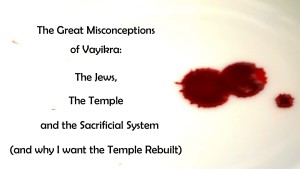 I am not proud of this, but I am going to be 100% honest. I have been known, in the past, to say – “Of course the Jews want the Temple back – it must be incredibly stressful to them to know that they aren’t being forgiven for their sins.”
I am not proud of this, but I am going to be 100% honest. I have been known, in the past, to say – “Of course the Jews want the Temple back – it must be incredibly stressful to them to know that they aren’t being forgiven for their sins.”
I would say that this is the misconception of almost everyone in the Christian world. It’s taught from the pulpits – but it isn’t supported by either Jewish thought or by the Scriptures. Remember that we are reading a translated document – a document translated by men who had that belief that without the blood of bulls and calves that there is no personal forgiveness for sins, but that is a loaded statement – what forgiveness of sins is being referred to in that statement and what was the function of blood in the Temple? This isn’t going to be an in depth teaching – this is going to be a skim. If you are going to read this and go no further then it is going to be a “taking my word for it” sort of situation but let’s be honest – all anyone can do in a short teaching is give you something to or not to believe in. What I will do is provide you with part of my study and reading list, as I always do. I am hoping that you won’t dismiss what I am saying out of hand, I want you to study it out. I understand that there are short and long teachings all over the internet, especially those little social media memes (posters) that tell you that something is true and they give you no (or questionably sourced) evidence – they are simply asking you to believe that they know what they are talking about. I am not going to do that – my goal is to give you something to consider and then the opportunity to replicate my studies in your own home.
This is a very simple teaching, a gloss and a gloss means – to deal with a subject too lightly
(Here is the teaching at kid level in video form)
First of all, credit where credit is due – Ryan White has an excellent course on his website called Temple Service According to Honor and Shame. It’s part of his Yeshiva and should be a required study for anyone wanting to discuss the sacrificial system. Some of the other books I have recently studied are in my Bibliography below. I am not going repeat his teaching, as I said, this is a skim presented more in parable form designed to help parents to teach their children about this week’s Torah portion. Not everyone wants to be or needs to be a scholar. There is a belief out there that the Jews are languishing in stress because they can’t bring animal sacrifices to atone for their sins, but there is a problem with this concept – namely because without a Temple in place, there is absolutely no reason to bring those types of sacrifices. There are a number of different kinds of sacrifices, and only some involve the ritual atonement of smearing blood upon either the outer bronze altar, the inner incense altar, or the sprinkling of blood on the Ark of the Covenant. Although all offerings (blood offerings, anyway) require the gifting of all the blood to the Lord (for the life is in the blood Lev 17:11), not all require the sprinkling or smearing of the blood on the horns or in the actual Holy of Holies. Why is that?
Well, some offerings are simply gifts of thanksgiving, a way to draw near to God within the framework of the Covenant relationship. Even the very word, sacrifice, korban – well, it means to “draw near.” It is the symbolic offering of a Covenant meal with the Lord in order to honor Him in the sight of the nations. Is it any different than honoring a guest by preparing a fine meal in their honor? In all cultures, “killing the fatted calf” is how one honors and draws near to someone else – whether relations are already good, or if they have been strained through sin or treachery.
So we aren’t going to discuss the “good relations” sacrifices, because in that case the blood is simply sprinkled around the base of the altar (maybe someday I will explain why they made sure to do that, but not today). We are going to discuss the intentional or unintentional sin sacrifices and why they had to be dealt with through the smearing, splashing, or sprinkling of blood on various Temple furniture and why we don’t see that practiced in the sacrifices before the tabernacle and why they are not needed in the absence of a Tabernacle or Temple and why they will resume, and should resume, when a new one is built. You will see why the Jews are not really stressing out about not being able to do this right now – it just isn’t the point of wanting to have a standing Temple. This has been a grave misunderstanding that has done a great injustice to people’s feelings about the Temple.
A standing Temple is about honoring God with an earthly sanctuary for His esteem and glory where He can dwell in the midst of His people, having a holy sanctuary, a sort of transitory place between Heaven and Earth. Period. It’s about having a central place of His choosing where He can be offered tribute as the King of kings and the Lord of lords, the Creator of Heaven and Earth. It’s about rendering honor in the way He has commanded and chosen. It’s about all of God’s people being able to gather during the three festivals to serve God with one shoulder and worship Him as one people.
When there is a Tabernacle or Temple, and the people who live in the vicinity of that structure sin – well, to oversimplify it, it brings grave dishonor onto that Tabernacle or Temple (I will refer to both Biblically as the “Dwelling Place” of God). If a normal worshiper sins, the amount of dishonor is far less than say, when a leader sins – especially the High Priest. This just makes sense. If an American goes abroad and behaves badly, it creates a small stain on the American reputation. If a senator behaves badly, the stain is much bigger, and the apology issued has to be greater. If the President behaves badly, we have a full blown international incident that brings great shame on our country. It isn’t anything you can see with your eyes (well, not in the days before the media, anyway), but the stain is there, dishonoring America. In the same way, we had the sins of the nation of Israel bringing shame on the Dwelling place of God.
For personal forgiveness, as in the case of David with Bathsheba and Uriah, repentance is all that has ever been required, but for the atonement and forgiveness of the shame and stain of our sins upon God’s holy Dwelling Place – the removal of that required blood. The life is in the blood – blood brings a purification; blood cleans away shame.
Think about sin as a form of invisible graffiti on your neighbors house, invisible, but your neighbor can see it and so can you even if other people can’t see where your tagging is. He has a beautiful house, but day by day the other neighbors tag it with their invisible spray paint – the layers of it are building up as he is disrespected. He knows it is there, and the disrespect and shaming become an unbearable stench in his nostrils until he can’t stand to live there anymore and he moves away – knocking the dust off his shoes as he leaves the neighborhood.
We see in the Scriptures similar concepts – if the Israelites became too wicked, God promised that the Land would “vomit them out.” During the exodus, after the incident with the golden calf, God didn’t want to be “in their midst” anymore – the idea was that if a place became too polluted with shame, God would not consent to dwell there anymore, because His holiness demanded better, and we see this throughout the ancient world. So what would happen in response to sin?
The person who sinned would bring the prescribed offering, lay his hand on it (lean on it) before the Lord and then sacrifice it. The blood from that offering would then remove the shame of his (and only his, and consequently his household’s) sins from the altar, it would remove that pollution from the specific altar he had shamed – be it intentional or unintentional and I am not going to elaborate on the differences here. The higher the rank, and the more rebellious the sin, the deeper the pollution went towards (and even into) the Holy of Holies). We see this very clearly in the application of Yeshua’s blood in the Heavenly Temple, once and for all cleansing that Temple in a way that the blood of bulls and goats could not. You will notice that in the Talmud it clearly states that for the forty years after Yeshua was killed, the Yom Kippur sacrifice was never accepted again (Yoma 39) – why? Because the unrepentant sin through the wickedness of the High Priest Caiaphus (under the authority of his father in law Annas and the Roman authorities who sold his family the priesthood when they weren’t even eligible Biblically) had so polluted the Temple that it could never be cleansed again – hence it’s destruction forty years later.
This is why such sacrifices not only do not, but cannot exist when there is no Temple – there is no sanctuary to pollute! It is also why, when there is no Temple, that no sacrifices at all can be offered because the blood belongs to God and it has to be presented to Him at a consecrated altar in the place where He has chosen and in the way He has chosen. To construct an altar in the backyard and call it holy ground is a severe encroachment upon God’s rights. Something isn’t holy just because we decide it is – we don’t have that authority. Something is only holy because God has set it apart.
I want to go back to the spray painted house. What if, before it got bad enough to drive the man out, the neighbors brought a bucket and sponges? What if they came by with a side of beef and said, “I am really sorry that I did this, I want you to accept this from me – I want to honor you because I have dishonored you. I want to make amends personally but not only that, I am here with a bucket and sponge to clean the graffiti off of your house that I put there. I want your home to be a place of honor again.” That is the atonement – when we undo the shame we have brought onto something or someone.
A new temple would constitute a fresh start, and would in no way be a repudiation of Yeshua because a Temple would in no way nullify what He came to do. He did not come so as to replace the Temple – after all, the Temple existed to honor God. Yeshua was livid, absolutely livid, when “His Father’s House” was being polluted by graft and other criminal activities. He taught in the Temple daily, when He was “lost” after the Passover at the age of twelve, He was doing “His Father’s business” in the Temple courts. Yeshua never spoke a word against the Temple and indeed, His disciples kept meeting there and Paul and some other young men took and completed vows there in the book of Acts, vows that required offerings (Acts 21). When Paul said that he “by all means must keep this feast” in Acts 18:21, he meant that he was returning to Jerusalem for the Passover – which meant the sacrifice of a lamb at the Temple for the yearly memorial/celebration dinner that exalted God for their deliverance from Egypt.
Everything done at the Temple was performed for the purpose of honoring God in one way or another – either through worship, through sharing Covenant meals, the giving of gifts, the making of restitution, etc. – it was (and will be) all about treating God like God and giving Him His due in sight of the world.
Daniel 9:27 contains a statement that should make sense now – that in the middle of the “seven” he will put an end to sacrifice and offering. Putting an end to sacrifice and offering serves one purpose and one purpose only – to allow the Temple to become more and more polluted, thus dishonoring God and creating an offense against Him. The Temple is about honoring God, but a Temple that exists without the cleansing of blood in the midst of a sinful world cannot honor God.
This is what the Jews want, not forgiveness – they understand that forgiveness has always been about repentance. Their daily prayers show this clearly. What they desire, is to add to their prayers the public honor that God deserves. That is my desire as well – I want that monstrosity gone and a Temple to the only one true God on top of the most coveted piece of real estate on earth. I want 24/7 webcams displaying the gleaming, gorgeous, pristine glory of a Temple built for the King of kings. I want what my Messiah wants – glory for His Father.
Let’s face it, we all want the Dome of the Rock to be trampled by pigs and get divinely catapulted into the sea. The Muslims did what Muslims do, they cleared the Temple Mount, looked at the outcropping of rock that protrudes from the pavement (the top of Mt Moriah) and built their own shrine over it – the very place where the Holy of Holies sat. To build over the holy sites of their conquered foe is nothing new. I want it razed, gone, replaced and forgotten.
That may seem like a lot but really, I just taught you almost nothing. This is an incredibly deep subject, far more concrete than we have given it credit for in how we were taught to spiritualize the entire sacrificial transaction.
Bibliography/Recommended Reading
White, Ryan Temple Service According to Honor and Shame, www.rootedintorah.com in the yeshiva section
Sklar, Jay Leviticus
Milgrom, Jacob Leviticus (Continental Commentary)
Gilders, William Blood Ritual in the Hebrew Bible

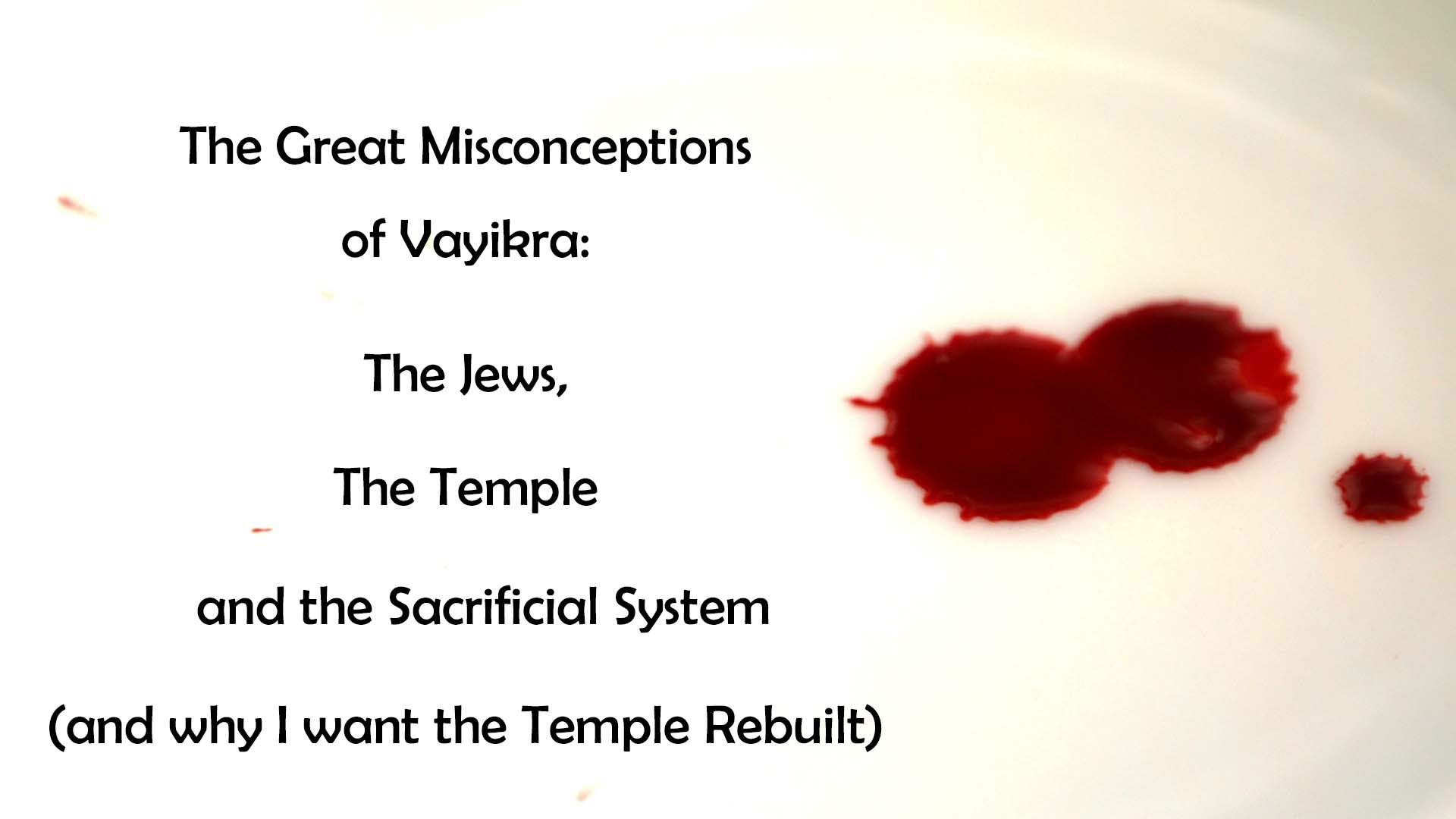


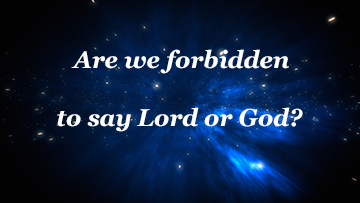
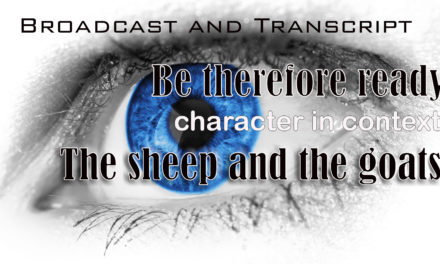
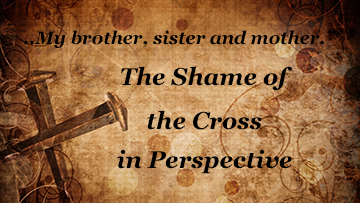















Tyler, this is, hands down, the best understandable piece of what the sacrifices were (and are) about. The way you write, to be able to communicate clearly, and to use modern examples, makes all of it understandable and casts it in the correct light.
Thank you for all you do, keep up the great work!
Shalom!
Thanks brother – this is what I had prepared for the Louisiana kids before we got flooded out and so I figured I would do this here instead. Getting ready to record it now.